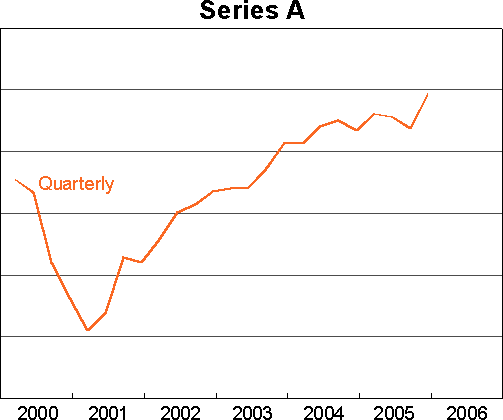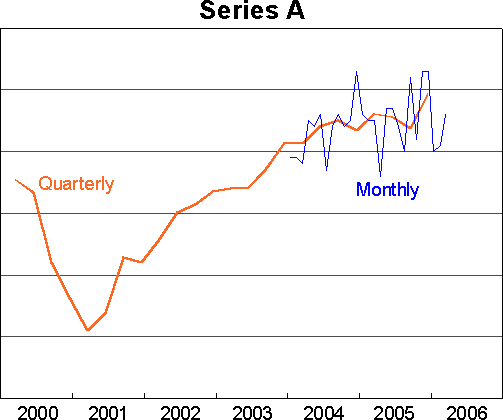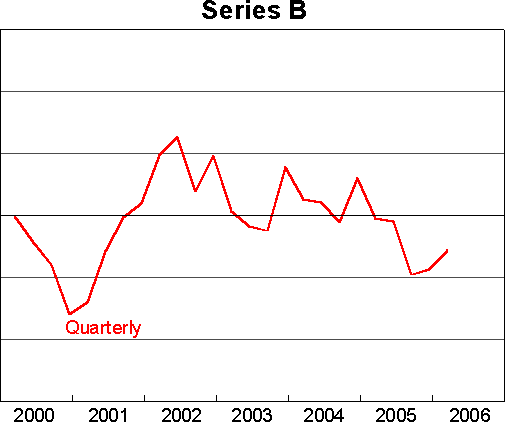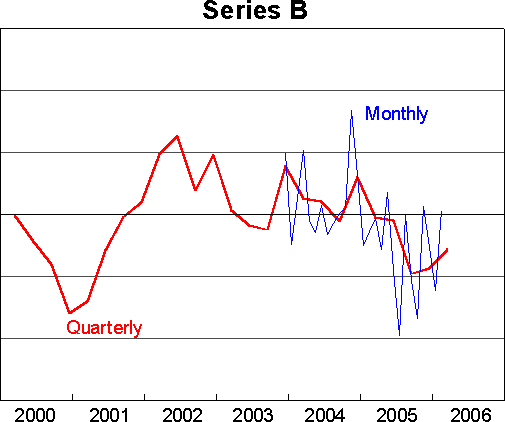Speech Economic News: Do We Get Too Much of It?

I.J. Macfarlane
Governor
Notes for a Talk to the Australian Financial Review Leaders' Luncheon
Sydney –
Some of you might be asking what am I doing here four days before a Board Meeting talking at an Australian Financial Review luncheon. That is a good question.
It started about two months ago when Joe Hockey, who was talking to me about a different subject, asked whether I would be prepared to speak to the Humpty Dumpty Foundation. I said that I would.
The Humpty Dumpty Foundation is a really good charity raising money for children at the Royal North Shore Hospital. I went to a dinner they had several years ago and it was great fun. Caroline O'Connor sang, Ray Martin was the MC, Phil Kearns spoke and I handed out the prizes. That was the sort of thing I was expecting when I said yes to Joe Hockey.
So, back to my original acceptance. The next thing I know is there are advertisements appearing in the AFR saying that I am going to talk about leadership or something like that. That was a surprise to me. The sponsorship by the AFR is due to the entrepreneurial efforts of Paul Francis, who is the main driving force behind the Humpty Dumpty Foundation. Well done, Paul.
Anyhow, I am very happy to be here today talking to such a distinguished gathering of people whose attendance is furthering the work of the Humpty Dumpty Foundation. But I hope you do not think you are going to get a dissertation on the state of the economy or the priorities for monetary policy because, if you do, you will be very disappointed. Instead, I thought I would talk about a different subject in a more light-hearted manner and so my talk today could be titled Economic News: Do We Get Too Much of It? I hope this does not sound like a roast for the Financial Review and its editor, Michael Gill. It is not meant to be. In any case, Michael is a good sport and he said he was happy for me to talk on this subject.
Many people, including me, have remarked on how much economic coverage there is in Australian papers – not just on the business pages, but on the front page and the editorial pages. Not only are the newspapers and magazines full of economic news, television news is saturated with it, there are special television programs devoted to it and radio programs as well.
Partly it is a worldwide phenomenon and you can turn on a television set in the morning in a hotel in Europe or North America and be surprised to hear someone holding forth on the latest movement in exchange rates or bond yields in much the same way as you can here. Not just CNN and CNBC.
While it is a worldwide phenomenon, it is more pronounced in Australia than elsewhere. I have often heard foreign visitors express surprise at how much coverage economic news gets in Australian newspapers, especially on the front page, compared with other countries. It is helped in Australia by the frequency of doorstop interviews that Treasurers, Ministers for Employment, Ministers for Trade and so on seem to be so keen to give every time a monthly or quarterly economic statistic is released by the ABS. Incidentally, when asked why they are so keen to give these interviews, they say they have to, or the newspapers and radio stations will seek out the Opposition spokesmen and quote them instead. I accept that explanation.
One reason that I have heard for the dominance of economic news in the Australian media is that there is not much else to report. We are not engaged in a civil war, we do not have a royal family, not on our own soil at least, few earthquakes, our politicians do not have private lives as lurid as the British ones, or some American Presidents. So, instead, our papers are taken up with balance of payments statistics, national accounts, unemployment rates and Budgets (and, of course, interest rates and monetary policy).
With the media competing so strongly against each other with their economic stories, there is inevitably a bias towards sensationalism. While Australia has some experienced and thoughtful economics commentators who are unquestionably of world class, it also has a multitude of eager beavers who are mainly concerned with tomorrow's headlines. They try to extract the maximum dramatic effect out of each ephemeral piece of news – monthly or even daily figures are invested with significance well beyond their actual information content.
Interest rates do not merely rise, they soar, the exchange rate dives or plunges and Budgets ‘blow out’. The reader can be left with an impression of constant action and turmoil.
There is a good side to this over-exposure to economics and a bad side. The good side is that there is quite a high degree of economic literacy in Australia compared with many other countries. My guess is that the average Australian voter is more familiar with concepts like inflation, unemployment, the balance of payments, fiscal policy and monetary policy than their equivalents overseas. I have no proof of this, it is only my impression. They are also quite unforgiving if their leaders appear to lack economic awareness, as a former Treasurer who was caught out not knowing that GOS stood for Gross Operating Surplus, will attest.
A consequence of their general economic awareness is that it probably contributed to making economic reform easier in Australia. We can see it most clearly in fiscal policy. We have been running surpluses for many years now, as you should in a sustained economic expansion. Most continental European countries have not got near that performance, nor has the United States. I think our ability to introduce a lot of the productivity and competition enhancing policy reform also benefited from this economic awareness. And as for labour market reform (or the lack of it), we only have to look at France where they have been rioting in the streets in favour of that great revolutionary cause – maintaining the status quo.
The bad side of all this economic news is that it tends to make people gloomy. So much of it focuses on things going wrong, policy stuff-ups, conspiracies and so on that the public is led to believe they are in a permanent state of crisis. I will say more about this later, and at the moment merely note that this used to be a bigger problem than it is now. Nearly fifteen years of economic expansion has finally reduced this tendency.
So far I have made a lot of generalisations without any empirical support. I would like to remedy that deficiency by reporting on a little survey we conducted about a year ago in the Reserve Bank comparing media coverage in Australia, the United States, and the United Kingdom.
We looked at newspaper coverage the day before, the day of and the day after monetary policy announcements by their respective central banks over two consecutive policy meetings. In each country interest rates were raised at least once in these two meetings.
We chose three newspapers in each country – one financial newspaper and the other two quality dailies.
- In the United Kingdom it was The Financial Times, The Times and The Independent.
- In the United States it was The Wall Street Journal, The New York Times and The Washington Post.
- In Australia it was The Australian Financial Review, The Australian and The Sydney Morning Herald.
We added up the number of articles mentioning monetary policy that had appeared in the three newspapers in each country in the days surrounding these two consecutive policy meetings.
- In the United States there were 35 articles.
- In the United Kingdom there were 46 articles.
- In Australia there were 131 articles, (In case you think we are exaggerating, we have a copy of each one.)
The equivalent for the number of front page articles:
- In the United States there was 1.
- In the United Kingdom there was 1.
- In Australia there were 14.
My only purpose in mentioning this is just to support my general conclusion that media coverage of economic news is much more intense in Australia than in these two major financial cities overseas. I could give other examples too – the Budget coverage is an obvious one – but I do not think I have to, as I have made my point.
I now want to move on to another aspect of economic news that makes for frequent coverage. Many private sector associations conduct surveys and publish the results of such things as business confidence, consumer confidence, hiring intentions, house prices and so on. Much of this data is very useful in helping to get a handle on what is happening in the economy and I do not want to dispute its usefulness.
Recently, however, I have noticed a new tendency whereby useful and respected quarterly surveys have chosen to augment their results with monthly updates. They have done this purely in the interests of being helpful. So now the journalists have four times as much data to report on – the original quarterly result and the three monthly updates. But has this extra data helped us understand the economy any better?
Let me show one well known quarterly survey which has proved useful over the years.

Now let us see what extra information we get if we superimpose the monthly data that has become available in recent years.

Has this made us better informed? I doubt it.
But it has given the reporters more stories to cover, so they can report how it soared one month, then plunged the next one before soaring again.
This is not the only example. Here is another one.


One can hardly blame the media for this, nor the bodies that produce the surveys – they were only trying to be helpful!
Let me finish by going back to the subject of whether the reporting of economic news unduly emphasises the negative. I think there has been a tendency for this to happen and there are several reasons that could be put forward. Ross Gittins has drawn attention to this on a number of occasions over the years, and his latest explanation, based on evolutionary psychology, appeared a fortnight ago.
The story is as follows: When our ancestors lived in caves, the fearless ones got eaten by bears and bitten by snakes and tended to die early and not leave many heirs. The timorous ones, who shirked danger, managed to survive and leave plenty of heirs. So over the thousands of years, evolution has led to the proliferation of timid genes. As a result, “responses to threats and unpleasantness are faster, stronger and harder to inhibit than responses to opportunities and pleasure”. According to this theory, it explains how the media select news. “News is anything the public finds interesting. But the stories the media judge to be newsworthy are preponderantly negative – bad news about natural disasters, accidents, crime, problems in the economy, stuff-ups by governments, arguments with other countries and all the rest.”
Gittins concludes by saying:
Some people imagine the media's role is to bring a balanced summary of what is happening in the world around us. Wrong. Their summary is deliberately unbalanced. They highlight and give an exaggerated impression of the extent of bad news because people find this interesting, while ignoring the non-bad news because it's boring.
I do not know whether Ross is trying to defend the media here or attack them. Is he blaming the readers or the media for this bias? Whichever way, I think he has a point. My guess is that for a given change in an economic statistic, an adverse movement is more likely to bring a headline than a favourable movement.
But there is also a very simple explanation in many cases. If, instead of being economists, we were in the airline industry, we could hardly complain that crashes attracted more publicity than safe landings. Or if we were politicians, we would expect that conflict within the party would be more likely to hit the headlines than harmony.
So my conclusion is that a tendency towards highlighting adverse developments and conflict is inevitable. There is nothing we can do about it. But that still leaves us without a convincing explanation for my main point. Why do we have such a preponderance of economic news in Australia compared with other countries? I do not know the answer – maybe one of you does.